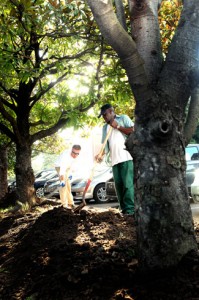Composting efforts restore balance, help campus trees thrive

The Vanderbilt campus is home to more than 7,500 trees – that adds up to a lot of leaves. But did you know that Vanderbilt Plant Operations’ grounds program has been harnessing nature’s own processes to help trees on campus weather the record heat this summer?
Mulching the areas underneath the trees with compost made from fallen leaves is a key part of maintaining ecological balance on campus from season to season. Refurbishing this ground layer with the right material and in a timely manner also takes advantage of recent rains.
“The basic ingredients come from the Vanderbilt trees themselves, but it takes a sustainable approach to capture the full benefit,” explained Bill Randles, turf and facilities manager for Plant Operations.
Vanderbilt’s grounds department applies the same principles on display at the small compost demonstration area behind The Commons Center to the huge pile of leaves stockpiled at Natchez Trace. This massive pile of leaves, accumulated over years, is transformed into compost and spread across campus planting beds. It creates an insulating layer that is especially needed during drought conditions, which are on the rise across the United States. Compost also remains porous, thus taking advantage of the recent rains by retaining ground moisture once water soaks under the nutrient-filled layer.
The results of this effort were recently put to use, when the rich, dark compost was loaded into trucks and delivered across campus to be spread under the trees that shed those same leaves several seasons ago.
“This is a key step toward the ongoing goal of rebuilding the soil structure in campus beds,” said Laura Barker, horticultural specialist with Plant Operations. In the years to come, a portion of each fall’s crop of leaves will continue to be shredded with mowers and spread thinly on top of the aging compost to avoid creating a density too thick for the necessary soil ventilation and oxygen exchange to occur.
“This is as green as it gets (in terms of) staying in balance with nature,” said Mark Petty, assistant vice chancellor of plant operations.
Read the full story on myVU.

Leave a Response